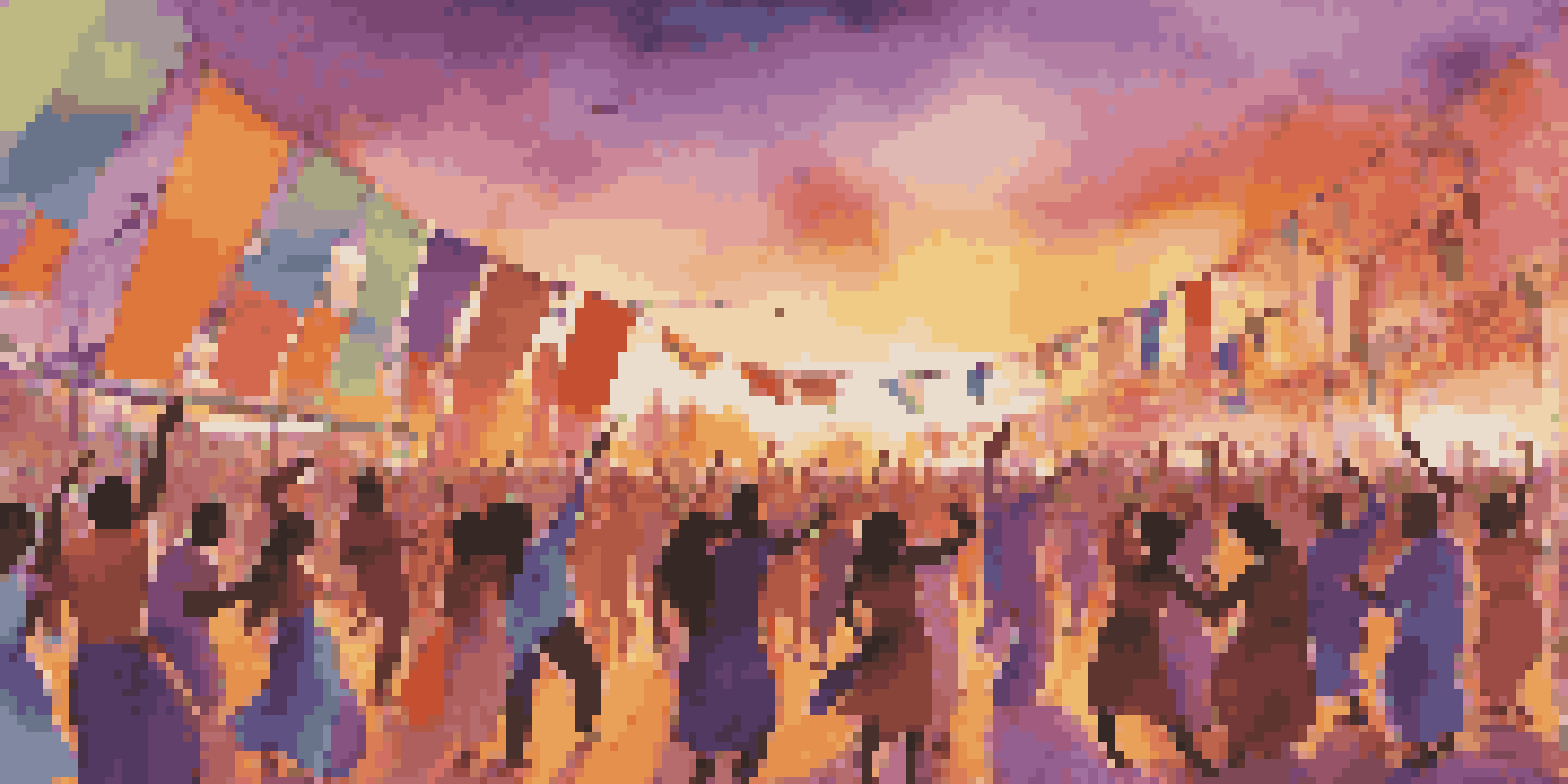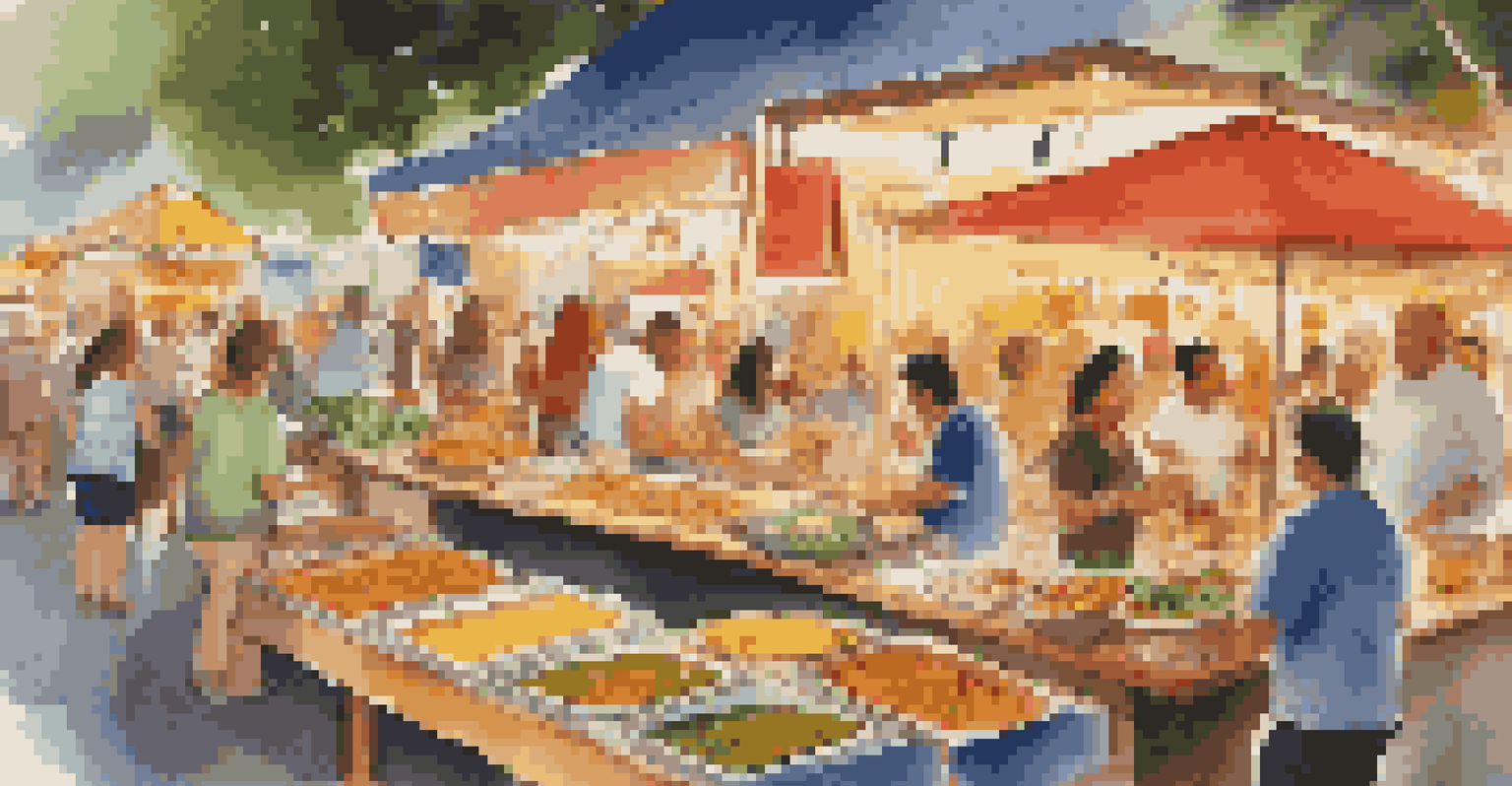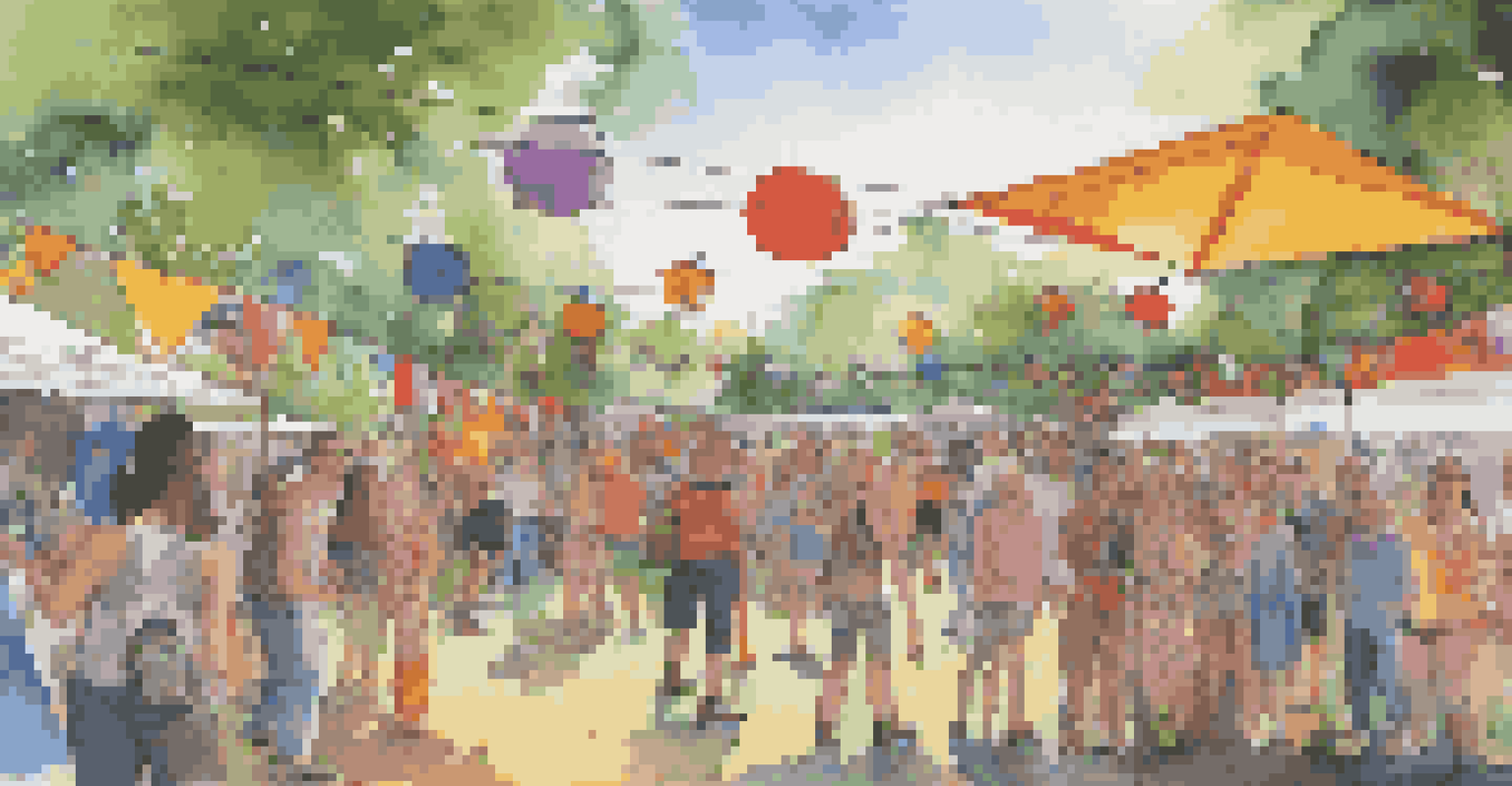The Cultural Exchange at Music Festivals Across Borders

The Global Stage: Where Cultures Converge
Music festivals serve as a vibrant tapestry of diverse cultures, showcasing artists from all corners of the globe. These events create a unique platform where traditional and contemporary music intertwine, allowing attendees to experience sounds they've never encountered before. For instance, a festival in Europe might feature African drumming alongside local folk music, creating a rich auditory experience.
Music is the universal language of mankind.
This convergence of cultures not only entertains but also educates festival-goers about the significance of various musical traditions. Attendees often find themselves dancing to rhythms they've never heard, sparking curiosity about the origins and meanings behind the music. Such exposure fosters a sense of appreciation for different cultural expressions, breaking down barriers and building connections.
As people share these experiences, they begin to engage in conversations that transcend language and geography. The joy of music becomes a universal language, enabling individuals to bond over shared emotions and experiences, regardless of their backgrounds. In essence, music festivals become melting pots of cultures, promoting understanding and unity.
Bridging Borders Through Collaborative Performances
One of the most exhilarating aspects of music festivals is the collaboration between artists from different countries. These partnerships often result in unique performances that blend various musical styles, creating something entirely new. Imagine a jazz musician from New Orleans teaming up with traditional Indian sitar players—it's a fusion that not only delights the audience but also embodies the spirit of cultural exchange.

Such collaborations are often born out of mutual respect and curiosity, leading to innovative sounds and artistic expressions. When artists share the stage, they bring their cultural backgrounds, stories, and musical techniques, enriching the overall experience for both performers and spectators. This not only enhances the festival atmosphere but also encourages artists to explore new creative avenues.
Music Festivals Unite Cultures
Music festivals create a unique platform for diverse musical traditions to converge, fostering appreciation and understanding among attendees.
Furthermore, these collaborative performances can inspire future generations of musicians. Young artists witnessing these cross-cultural synergies are often motivated to experiment with their own music, leading to a more diverse and inclusive music scene. Thus, festivals not only celebrate existing cultural exchanges but also lay the groundwork for future artistic innovation.
Culinary Delights: A Feast for the Senses
Beyond music, festivals often highlight the culinary richness of different cultures, offering a gastronomic journey to attendees. Food stalls featuring international cuisines become a significant part of the festival experience, allowing visitors to taste authentic dishes from around the world. From spicy Thai curries to savory Mexican tacos, these culinary offerings enhance the festival's cultural tapestry.
Food is our common ground, a universal experience.
This gastronomic aspect of music festivals enables attendees to engage with cultures in a deeply personal way. Sharing a meal can be a profoundly communal experience, often leading to new friendships and shared stories. Just as music transcends language, food has the power to unite people over common tastes and experiences.
Moreover, food vendors frequently share the stories behind their dishes, providing insight into their cultural significance. This aspect of cultural exchange fosters an environment of learning and appreciation, as festival-goers not only savor new flavors but also gain a deeper understanding of the traditions that shape those culinary practices.
Art and Craft: Showcasing Global Creativity
Many music festivals incorporate visual arts and crafts, featuring artists from various backgrounds who showcase their work. This inclusion allows attendees to appreciate the artistic traditions of different cultures, from intricate handmade textiles to vibrant paintings. These art installations often tell stories, reflecting the history and values of the artists' communities.
By supporting local artisans, festivals contribute to the preservation of cultural heritage and promote sustainability. Attendees can purchase unique pieces, ensuring that their memories of the festival extend beyond just music and food. This aspect of cultural exchange highlights the importance of creativity in connecting people from various walks of life.
Collaboration Fuels Innovation
Artists from different backgrounds collaborate at festivals, resulting in innovative performances that inspire future generations of musicians.
Additionally, interactive art installations encourage participation, inviting festival-goers to engage with the art on a personal level. This hands-on approach fosters a greater appreciation for the creative process while allowing individuals to express themselves in new ways. Ultimately, the visual arts at music festivals enrich the cultural experience, making it even more immersive.
Creating Lasting Connections Through Shared Experiences
Music festivals create a unique atmosphere that encourages interaction and connection among attendees. The shared experience of enjoying live performances fosters a sense of community that often extends beyond the festival grounds. Many festival-goers leave with new friendships, as the joy of music brings people together in ways that few other experiences can.
These connections are often strengthened through shared moments, whether it's dancing to a favorite song or bonding over a unique cultural experience. Such interactions can lead to friendships that span across borders, with attendees promising to meet again at future festivals or even visit each other’s countries. This sense of kinship highlights the power of music to unite people, regardless of their backgrounds.
Moreover, social media has amplified these connections, allowing festival-goers to share their experiences and keep in touch long after the last note has faded. The memories created at these events often become cherished stories, passed down and retold, emphasizing the role of music festivals as catalysts for meaningful relationships.
The Role of Technology in Cultural Exchange
In today’s digital age, technology plays a crucial role in enhancing cultural exchange at music festivals. Live streaming, social media, and mobile apps allow audiences worldwide to participate in these events, regardless of their geographical location. This accessibility means that more people can experience the rich tapestry of cultures represented at these festivals.
For instance, attendees can share their favorite moments in real time, inviting friends and followers to join in the celebration. This online engagement helps create a larger community that extends beyond those physically present, fostering connections among diverse groups of people. The shared experience of music becomes a global phenomenon, transcending borders and time zones.
Culinary Experiences Enhance Culture
Food stalls at festivals offer attendees a taste of international cuisines, deepening their engagement with various cultures through shared culinary experiences.
Furthermore, technology also provides platforms for artists to showcase their work, helping them reach wider audiences. Many musicians have gained international recognition through online exposure, leading to collaborations that further enrich the cultural exchange at festivals. Thus, technology not only enhances the festival experience but also amplifies the voices of artists from various cultures.
Promoting Cultural Awareness and Understanding
At their core, music festivals are powerful tools for promoting cultural awareness and understanding. By showcasing diverse musical styles and traditions, these events encourage attendees to appreciate the richness of global cultures. This exposure often leads to a greater understanding of the societal and historical contexts that shape different musical expressions.
In addition, educational workshops and discussions often accompany music festivals, providing deeper insights into the cultures represented. These sessions can cover everything from traditional instruments to the history of specific genres, fostering a sense of respect and curiosity among participants. Attendees leave not only entertained but also enriched with knowledge about the cultural significance behind the music.

Ultimately, the cultural exchange at music festivals contributes to a more inclusive society. By breaking down stereotypes and encouraging dialogue, these events help cultivate a spirit of empathy and understanding. In a world that often feels divided, music festivals remind us of our shared humanity and the beauty of diversity.